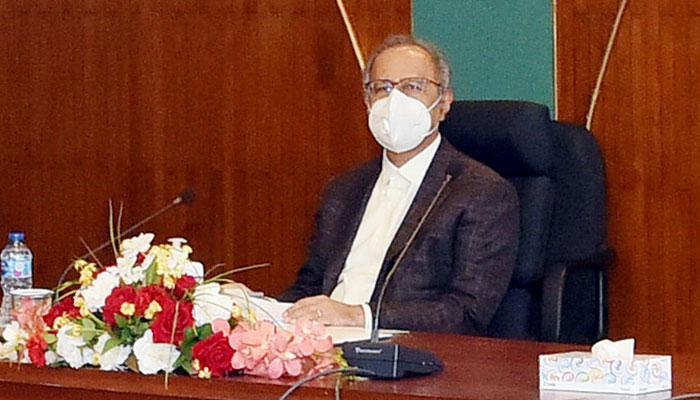Adviser stresses measures to curb high profit margins
ISLAMABAD: Adviser to the Prime Minister on Finance and Revenue Hafeez Shaikh on Monday urged the officials to take necessary administrative measures to reduce high profit margins between wholesale and retail levels.
“It is our responsibility to ensure availability of the essential items for the consumers at affordable prices,” Shaikh said addressing the national price monitoring committee meeting.
Finance adviser appreciated the efforts of federal ministries, provincial governments and other relevant stakeholders for price control. The same momentum must be maintained to provide maximum relief to the general public, he said. “Provincial governments should workout plan to ensure smooth supply of perishable items to avoid any undue price hike.”
The committee reviewed the price trend of the essential commodities, including wheat flour, sugar, tomatoes, onions, vegetable ghee, potatoes and chicken on weekly basis.
Shaikh held a detailed discussion with the provincial chief secretaries regarding position of wheat and sugar stocks in the provinces.
The meeting was informed sufficient quantities are available to meet existing demand. There is decline in the prices of 10 essential commodities for instance wheat flour, sugar, onions, tomatoes and chicken while the prices of 11 commodities have increased slightly, according to the latest weekly sensitive price indicator. Price of 30 items remained stable.
The meeting was updated on import of wheat during the meeting. The logistics committee played a key role in resolving issues related to wheat and sugar stocks among provinces, it was informed.
Provincial governments and Utility Stores Corporation (USC) were directed to reassess their import requirements for wheat and sugar and take up with the food ministry accordingly.
The matter may be placed before the Economic Coordination Committee of the cabinet for approval. Industries ministry was asked to immediately take up the requirement of wheat and sugar with Pakistan Agricultural Storage and Services Corporation and Trading Corporation of Pakistan (TCP).
The government is working on three ways to meet more than 2.5 million tons of wheat shortfall this year. Private sector, TCP and government-to-government deals are encouraged. Private sector was allowed to import wheat for an unlimited period. Regulatory duty of 60 percent, customs duty of 11 percent, sales tax of 17 percent and withholding tax of six percent were abolished on the import. Imported wheat has also been exempted from the anti-hoarding law imposed by the provincial governments on producing verified import records by the importers.
-
 Everything We Know About Jessie J's Breast Cancer Journey
Everything We Know About Jessie J's Breast Cancer Journey -
 Winter Olympics 2026: What To Watch In Men’s Hockey Today
Winter Olympics 2026: What To Watch In Men’s Hockey Today -
 Winnie Harlow Breaks Vitiligo Stereotypes: 'I'm Not A Sufferer'
Winnie Harlow Breaks Vitiligo Stereotypes: 'I'm Not A Sufferer' -
 Apple Martin Opens Up About Getting 'crazy' Lip Filler
Apple Martin Opens Up About Getting 'crazy' Lip Filler -
 Why Did OpenAI Remove One Crucial Word From Its Mission Statement?
Why Did OpenAI Remove One Crucial Word From Its Mission Statement? -
 Prince William Warned His Future Reign Will Be Affected By Andrew Scandal
Prince William Warned His Future Reign Will Be Affected By Andrew Scandal -
 Amy Madigan Reflects On Husband Ed Harris' Support After Oscar Nomination
Amy Madigan Reflects On Husband Ed Harris' Support After Oscar Nomination -
 Is Studying Medicine Useless? Elon Musk’s Claim That AI Will Outperform Surgeons Sparks Debate
Is Studying Medicine Useless? Elon Musk’s Claim That AI Will Outperform Surgeons Sparks Debate -
 Margot Robbie Gushes Over 'Wuthering Heights' Director: 'I'd Follow Her Anywhere'
Margot Robbie Gushes Over 'Wuthering Heights' Director: 'I'd Follow Her Anywhere' -
 'The Muppet Show' Star Miss Piggy Gives Fans THIS Advice
'The Muppet Show' Star Miss Piggy Gives Fans THIS Advice -
 Sarah Ferguson Concerned For Princess Eugenie, Beatrice Amid Epstein Scandal
Sarah Ferguson Concerned For Princess Eugenie, Beatrice Amid Epstein Scandal -
 Uber Enters Seven New European Markets In Major Food-delivery Expansion
Uber Enters Seven New European Markets In Major Food-delivery Expansion -
 Hollywood Fights Back Against Super-realistic AI Video Tool
Hollywood Fights Back Against Super-realistic AI Video Tool -
 Meghan Markle's Father Shares Fresh Health Update
Meghan Markle's Father Shares Fresh Health Update -
 Pentagon Threatens To Cut Ties With Anthropic Over AI Safeguards Dispute
Pentagon Threatens To Cut Ties With Anthropic Over AI Safeguards Dispute -
 Samsung Galaxy Unpacked 2026: What To Expect On February 25
Samsung Galaxy Unpacked 2026: What To Expect On February 25




